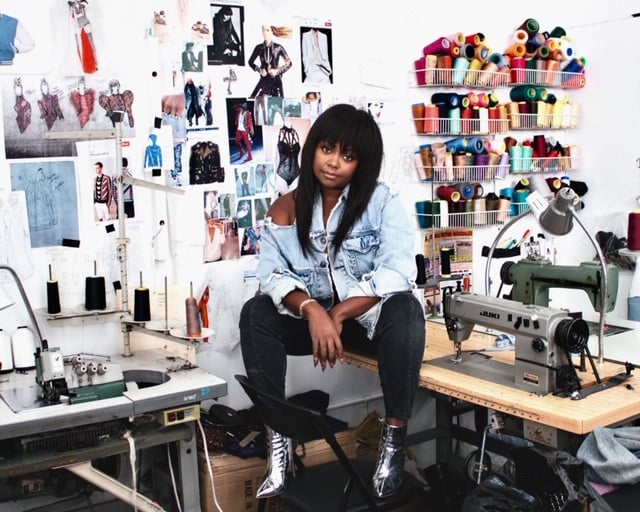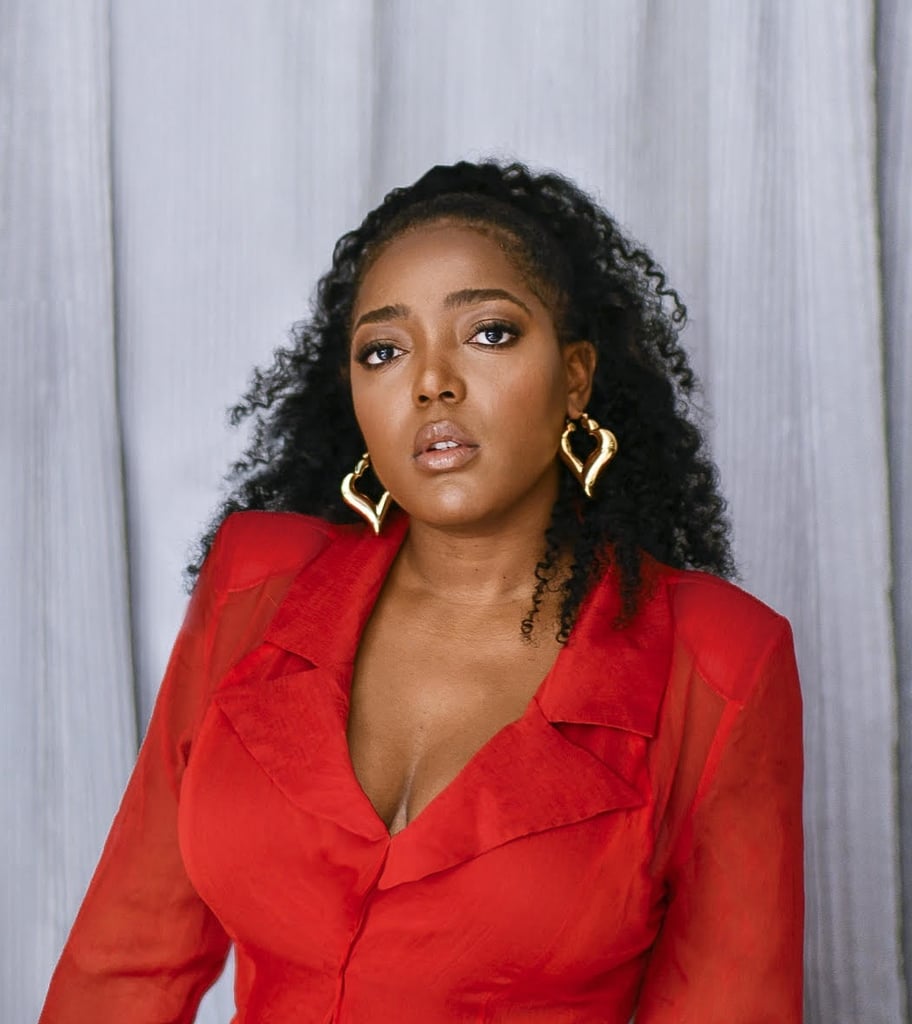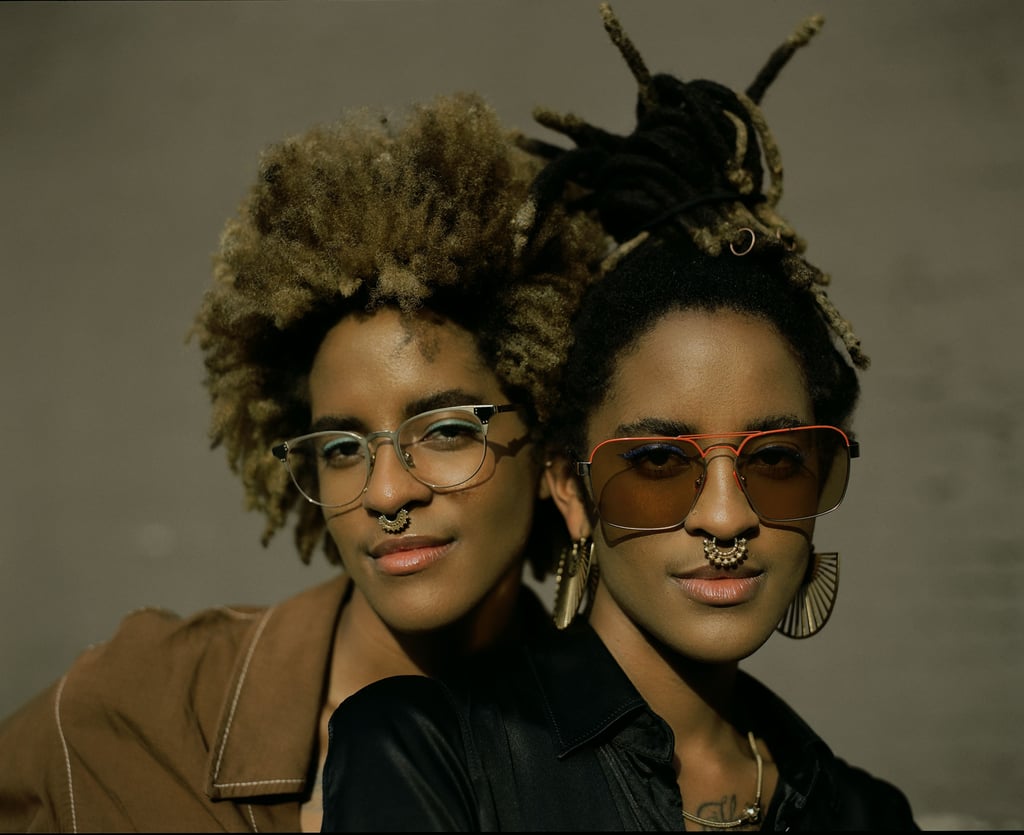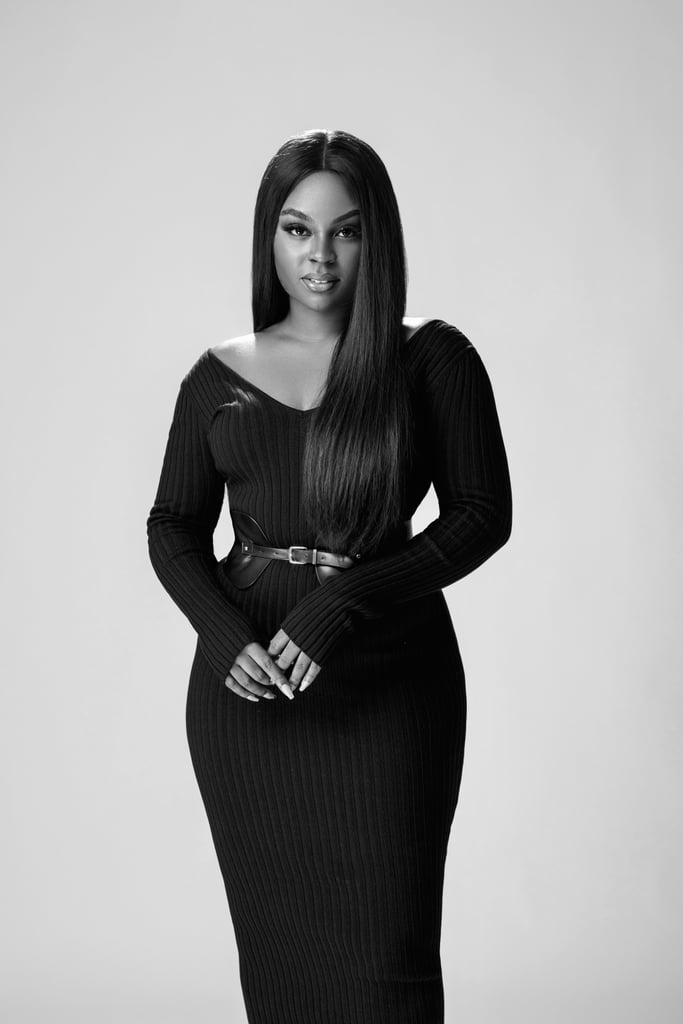Black women are patently some of the most talented designers in the ever-changing fashion industry. Creatives of colour, who come from all walks of life, have stepped onto the scene and showcased their distinctive tastes and styles. Coalescing their cultural backgrounds with their experiences as women, many have challenged and disrupted the traditional ethos of the business.
Among them are designers Brea Stinson of Stinson Haus [1], Anifa Mvuemba of Hanifa [2], Dumebi Iyamah of Andrea Iyamah [3], and twin sisters Corianna and Brianna Dotson of Coco and Breezy Eyewear [4]. With unparalleled flair and the drive to uplift underrepresented groups, these sartorial masterminds are making waves in the business. POPSUGAR spoke with all of them to find out how they're moving the conversation forward.
Brea Stinson of Stinson Haus

Brea's journey has been a long and winding road. The Detroit-born, LA-based designer took interest in fashion in college when she designed homecoming dresses for her fellow Clark Atlanta University schoolmates. As a student, she also opened her own boutique in Little Five Points, a popular shopping area in Atlanta.
The wheels really started turning after a classmate introduced her to a wardrobe stylist who gave her hands-on experience with tailoring. And during her final Spring break of senior year, a trip to New York changed her life. "The break happened to be during fashion week, and I met Patricia Field, who was the stylist for Sex and the City [5] at the time," Brea told POPSUGAR. The two clicked and Patricia encouraged the rising talent to move to the Big Apple. "She was like, 'If you have some job leads, you can tell them that you're my assistant,'" Brea added. "She was the plug. It gave me all the confidence in the world."
After graduating, Brea ended up helping Patricia with a couple of projects before starting another job in the city as a key assistant to someone she initially met in Atlanta. For three years, she styled some of the biggest names in Hollywood, including JAY-Z as he promoted his 2003 LP, The Black Album. And when she got the call to create a look for Willow Smith ahead of the "Whip My Hair" singer's 2011 appearance on BET's 106 & Park [6], Brea moved to LA and followed through on making a pair of Gareth Pugh-inspired pants with chain details. From there, "it was off to the races," she said.
"I've always clung to that sense of ownership and having the right to take up space."
Brea has now styled the likes of Beyoncé, Ciara, H.E.R., Lizzo, and Anderson .Paak. She hopes to add Billie Eilish to the list one day. Thus far, her most surreal client has been Stevie Wonder [7]. "Being from Detroit and being obsessed with Motown, I just — I could cry right now — I never would've imagined getting that phone call," she said. "And he was so lovely, generous, and caring. It was a full-circle moment for sure."
Although she's lived in LA for about a decade, Brea's Detroit upbringing heavily influences her work, which she describes as "comfortable confidence with an edge." Her loose two-piece ensembles have a certain coolness, her outwear is embellished with glitzy baubles, and her fabrics are infused with vivacity. "Detroit's a really rough and gritty city," she said. "But then there's something fabulous about the people and their confidence. The essence of Motown is still sprinkled all over that place. There's this element of glamour and audacity. I've always clung to that sense of ownership and having the right to take up space."
She hopes to eventually translate that sentiment into a full-blown collection. "Last week, this psychic told me, 'The world still hasn't seen what you can do.' So this is just the beginning." And as she continues to push herself, one thing remains her biggest motivator: her family. "They've always been encourageing and supportive, so I want to make them proud," she gushed, adding that some of them still don't fully understand her line of work. "I think my grandfather still thinks I do hair because that used to be my hustle in high school," she said with a laugh. "And my grandmother, when I showed her an article about my couture designs, she goes, 'Huh? What's couture about this?' I was like, 'Never mind, grandma.'"
Where to follow: @breabstar [8]
Anifa Mvuemba of Hanifa

Anifa has always had a love of fashion, and it grew as she got older. She remembers getting her first sewing machine in her early 20s and using it to restructure men's blazers and button-down shirts. She also created dresses for some of her friends at Morgan State University in Baltimore and posted the finished looks on Instagram. Around 2011, her designs began garnering attention on social media, and the following year, she launched her business.
Her size-inclusive label, Hanifa [9], offers "bold, feminine, and chic" garments. Her pieces often incorporate pops of colour and some element of sophistication, whether it's a cinched waist or a form-fitting silhouette." My brand is a reflection of myself," said the Maryland-based designer. "I started this when I was 21, and I've grown so much as a businesswoman. It's all evolved. I just want to make sure that I'm staying true to myself and creating pieces for women like me." According to the tailor, that means crafting outfits that exude self-assurance.
Anifa also draws insight from her faith. "I'm Christian, so I believe this gift comes from the Lord, and I try to be really aware of that," she said. "Sometimes I'll get design ideas in my dreams, and I'll wake up in the middle of the night and sketch them quickly. I'm also into interior designing and architecture, so I look at a lot of that stuff, too. I also like to look at my past work and try to make it better."
"You have to really want it, and you have to go and get it. People think you have to be in these fashion capital places, but you don't."
Through her upward climb in fashion, the designer — who was recently spotlighted as Teen Vogue's Generation Next Designer [10] — has noticed a few issues she hopes to fix within the industry. "As a designer, if your clothes are too tight, you're automatically categorized as 'urban wear,'" she said. "A lot of women like their clothes to fit that way, so who's to say that's not luxury?" Another problem she's set on rectifying is the notion that there can't be more than one Black woman at the top of the totem pole. "There are people who look like me who are at those tables, but at the same time, I feel like they want to be the only ones at the table," she noted. "They're not really extending a hand. I'm not saying, you absolutely have to reach out. But there are a lot of talented people — my people — who need to be recognised. There's room for all of us."
This has prompted Anifa to start CBYAM [11], a creative agency that helps emerging designers with things like sampling and small-scale manufacturing. "That was something that was hard for me to figure out when I started," she said. "I just hope to change that narrative of 'I've made it, and I'm going to be the only one here.'"
That being said, Anifa wants young designers of colour to keep two things in mind while working their way up: "You have to really want it, and you have to go and get it. People think you have to be in these fashion capital places, but you don't. Also, get a mentor. I'm grateful for my experiences, my trials, and my tribulations, but I think it would've been a little less painful if I had someone coaching me and giving me advice. I didn't have access to working at a fashion house as an intern or a magazine, so having a mentor is important."
Where to follow: @anifam [12]
Corianna and Brianna Dotson of Coco and Breezy Eyewear

Growing up, twin sisters Coco and Breezy had an off-beat aura that didn't always jive with their peers. Having creative outlets like fashion and music gave them something to pour themselves into as they began to see the power of expression and forming their own narrative. At age 19, they started their eyewear company, offering some of the funkiest, chicest pairs of optical specs and sunglasses [13] on the market.
Breezy and Duane Baker, the brand's other cofounder, often handle the design and product development aspects of the business. Travelling, admiring architecture, and simply keeping their eyes open are some of the ways they think of concepts. For Breezy, listening to music also helps her outline ideas — literally. "When I'm designing, the frequency of the music guides my hand to move a certain way," she said, adding that she and Coco are also DJs [14]. Breezy and Duane then bring their designs to Coco whose knack for making small but significant tweaks helps perfect the prototype.
"Black girls who have piercings, natural hair, and tattoos can be entrepreneurs and go to business meetings looking like that."
Cultivating a sense of community within their brand originates from their cultural background and how they grew up. Their mother is Puerto Rican, and their father is Black, so they were taught that family and loyalty is everything. Their parents also instilled a certain hustle mentality that's kept them on a steady grind. "We grew up in a low-income neighbourhood but had such rich culture in our family," Coco said. "Our dad, being from the South, grew up during segregation when Black people weren't being hired for a lot of jobs. So he taught us to pave our own way and create something on our own."
This is why Coco and Breezy, who were featured on Hulu's Feb. 16 episode of Your Attention Please [15], are huge proponents of manifesting — something they even reflect in the names of their eyewear. While one customer might be attracted to a pair of glasses labeled as "Amparo [16]," which means "protection" in Spanish, another might need some "Zen [17]" in their life. "Coming up with the names is one of my favourite parts," Breezy said. "They're all very intentional. We're big on speaking things into existence, so if you're wearing a pair of glasses called 'Gratitude,' that's just one step closer to you actually exercising gratitude." They've also named some of their wares after people they know and streets they've lived on as a way to share their story.
"Everyone says when they put our glasses on, they exude a different personality."
Above all, the eyewear creatives want to make everyone feel seen and represented. Breezy, who has previously spoken about her identity as a queer woman of colour [18], says they really want to highlight a spectrum of narratives. "Our brand lives and breaths inclusivity," she said. "When we started our company, we were the outsiders and the loners. So when it comes to our hiring process, our campaigns, and our branding, we give everyone opportunities. It's just natural. Because of that, we attract people who are a part of the LGBTQ+ community and people who are Black or brown or may have a disability." Even marketing their glasses as genderless, Coco added, is a way for them to empower their customers to rock whatever style they want.
"It's important for us to show all people who come from low-income areas without access to resources that they can get from one point to another," Coco continued. "And Black girls who have piercings, natural hair, and tattoos can be entrepreneurs and go to business meetings looking like that."
Although a handful of notable A-listers have worn the sisters' specs — Beyoncé, Prince, Yara Shahidi, the list goes on — they feel most fulfiled when they spot a random stranger wearing their eyewear. "I'll never get used to it," Breezy mused. "I just freak out." Coco shared the same sentiment, revealing that she sometimes approaches people. "Everyone says when they put our glasses on, they exude a different personality," she said. "So when I see someone in our shades, I like to observe them. I'll usually let them walk about a block, and I'll follow them and be like, 'Excuse me! You're wearing our product!' And they're like, 'Who's this crazy person yelling at me?' Then I'll say, 'My name's on those glasses. I'm Coco!' It happens pretty often and in some random places."
Where to follow: @cocoandbreezy [19]
Dumebi Iyamah of Andrea Iyamah

Dumebi developed a passion for clothing at a very young age. Her mother owned a boutique and her father loved travelling and style, so having a sense of fashion was instilled in her early on. She began making clothing in high school and from there, her creations evolved into her label, Andrea Iyamah [20].
The brand largely consists of resort wear, which partially stemmed from Dumebi's inability to find fashionable swimsuits that fit her fuller figure. Vivacious, elegant, and free-flowing, her aesthetic is mostly guided by her Nigerian background. "My work always has to tell some form of a cultural story," she said. "It has to imitate colours, silhouettes, or motifs from my environment and have a burst of excitement. We also like to add modern twists through structural shapes or something inspired by nature. I'm a nature girl, so things that are breezy and natural tend to attract me. We also design all of our prints in-house, so that's a big part of our story."
"When someone else believes in your story and wants to be a part of it, that's inspiring. That's the bigger picture — women seeing our designs as a part of who they are."
While envisioning "the A.I. woman," Dumebi likes to think of a purchaser packing her colourful swimsuit [21] with a fluid printed cover-up [22], ready to partake in some self-care on a relaxing getaway. "Clothing that speaks to you culturally and spiritually is important," she said. "When you take a break and go to the beach or whatever the case may be, your outfit is just as important as attending a serious event. You want to be comfortable and confident when you're taking time for yourself. That's really what we design for. We don't necessarily design swimwear for you to be Michael Phelps; we design it to make you feel good and give you that burst of confidence wherever you are. And it's for everybody of any size and any colour."
The biggest driving force behind Andrea Iyamah is the idea of interconnectivity. "The most surreal thing for me is seeing everyday women wear A.I.," she said. "When someone else believes in your story and wants to be a part of it, that's inspiring. That's the bigger picture — women seeing our designs as a part of who they are." That's why Dumebi and her team created the Instagram page A.I. Treasure [23], which posts photos of customers modelling some of the pieces.
More than anything, Dumebi is motivated by her own passion and pure adoration for creating memorable looks. "When I started this brand, it wasn't me trying to make any political statement," she said. "I realise how doing it is a political statement for someone else, and I definitely respect that. But I never really thought about my skin colour or gender as a big thing. I'm just making something beautiful for women who look like me because it's what I love to do. And I do hope to see more designers of colour with that passion in the industry."
Where to follow: @andrea.oi [24]